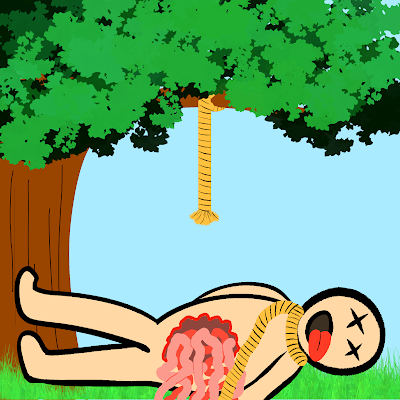How did Judas Iscariot Die?
Judas Iscariot is well-known for betraying Jesus in exchange for 30 pieces of silver. It may come as a surprise to learn that he died in two different ways in the Bible--and the stories are peppered with other contradictions too.
What did Judas do with the silver?
- In Matthew 27, he throws the silver back at the chief priests in the temple in a fit of remorse. The counsel then buys a field.
- Acts 1:18 states that Judas bought a field with the money.
Apologetic response: Judas indirectly bought the field via the priests.
Counter Apologetic: The apologetic response is not the best explanation of the text. Matthew clearly states that the priests bought the field, but Acts says "this man acquired a field"...and then goes on to describe his death. This seems to imply that Judas acquired the field and then died. It also mentions nothing of the priests. Read independently of Matthew, nobody would infer that anyone else bought the field on his behalf.
How did Judas die?
- In Matthew 27:5, immediately after returning the money, he "departed, and he went and hanged himself." There is no mention of his suicide being in a field.
- In Acts 1:18, Judas, "falling headlong, he burst open in the middle and all his bowels gushed out". This takes place in the field in question.
 |
| Is this really what Acts describes? |
Apologetic response: The rope Judas hanged himself with likely broke, causing his already decaying corpse to fall and rupture in the field.
Counter Apologetic: This is a convoluted and dishonest explanation. Here's why.
- The word "headlong" is from the Greek "prénés", meaning "leaning (falling) forward ("prone"), i.e. Head foremost -- headlong". Imagine a rope breaking and a corpse falling to the ground. Would his head fall first? No, his feet would hit the ground first, followed by knees or butt, and then head. This does not fit the definition of the Greek word "prénés" very well.
- In order to reconcile the issue about the field, Christians insist that the counsel bought the field, not Judas. But why would Judas have gone to the field if he hadn't been the one to buy it?
- It would have taken a long time for the counsel to go property shopping, agree on a field, and complete the transaction. This probably would not have happened while Jesus was on trial, which would mean Judas didn't kill himself until way later. See more.
- The breaking rope is an invented detail. It is not in the text.
- If you were trying to explain someone's cause of death by hanging, would you leave out the hanging part, but instead describe falling headfirst and entrails pouring out?
- Imagine that a neighbor's death was described to you in these two different ways. Would you suspect that one or both of the accounts was wrong, or would you accept both at face value?
How was the plot of land named?
- In Matthew, the Greek name for the plot of land is "agros haimatos", which means "field of blood".
- In Acts, the Greek name for the plot of land is "chorion haimatos", which means "Property of Blood" or "Land of Blood".
Apologetic response: I could not find much in the way of apologetic response. I did find one apologist (who believes in inerrancy) that claims these are two different plots of land. My Lutheran Study Bible (ESV) claims there is only one plot of land.
Counter Apologetic: Though both terms are translated to "field of blood" in most Bible translations, it's interesting that two different Greek words are used. In Matthew, it is stated that "it has been called agros haimatos to this day." In Acts, it is stated that it became known to all the inhabitants of Jerusalem as chorion haimatos. It is possible that there are simply two different names for the same place, but taking into account all the other differences, it is further support for these being separate stories.
Another difference is the reason that these places were labeled "haimatos" or "blood". In the Matthew version, it is called "Field of Blood" because it was purchased with blood money (money Judas received for betraying Jesus). In the Acts version, it is more likely from the context that the term "blood" comes from the gruesome death of Judas that took place on the land.
This apologist admits that these two descriptions are contradictory--but the Bible isn't wrong, because there must have been two plots of land. Gee, what are the odds? Two plots of land with similar names in the same place and associated with Judas? That must be confusing to the locals.
Was Judas remorseful?
- In Matthew, Judas was clearly remorseful. "When Judas, who had betrayed him, saw that Jesus was condemned, he was seized with remorse and returned the thirty pieces of silver to the chief priests and the elders. 'I have sinned,' he said, 'for I have betrayed innocent blood.'"
- In Acts, Judas kept the money and bought a field, in which he later fell over and died. No mention of remorse, and these are not the actions of a remorseful man anyway.
Is Judas a contradiction?
Yes. Absolutely. The apologist can grasp at threads and connect them together in a way that doesn't make much sense, but technically unifies both narratives in the most unlikely way possible. But is it reasonable? Is it the best explanation? If the apologist were not under an obligation to prove the Bible inerrant, would they accept their own reasoning?
When we need to start changing the meaning of words and phrases, then we are detracting from the Bible's authenticity overall. For example, the apologist is insisting:
- When the Bible says "falling headlong and bursting open", it actually means, "he hung himself"
- When the Bible says "he acquired a field", it actually means, "someone else bought a field with money Judas gave them before killing himself"
According to the apologist, the Bible often presents facts in this way--convoluted, twisted, deceptive, especially considering that the Bible is supposedly authored by GOD HIMSELF. Why would God present information this way? To deliberately confuse us? To cast doubt on his word? To test our faith? That's just cruel.
It is way more likely that these stories were authored by two separate humans who knew of two slightly different versions of the story. It isn't based in reality, and it isn't divine truth.
Hypothetical
How did Larry die?
Account 1: "Larry had a heart attack while watching TV in his basement."
Account 2: "Larry was shot in the head while driving down Main Street."
Critical thinker: "We should investigate further because these scenarios conflict and it is extremely unlikely that both are true."
Apologist: "No problems here. Larry died of a heart attack in his basement. The hearse was caught in crossfire on the way to the funeral home and a bullet lodged itself in Larry's head."
Do you see what the apologist has done here?
- Instead of going for the simplest explanation, he has gone for the most complex.
- The apologist is inventing details to satisfy both scenarios.
- The apologist is ignoring details that would interfere with the harmonization--the fact that Larry was driving down Main Street.
- The apologist does not care about finding the actual truth--only about harmonizing the stories.


Comments
Post a Comment
Please leave a respectful and kind comment.